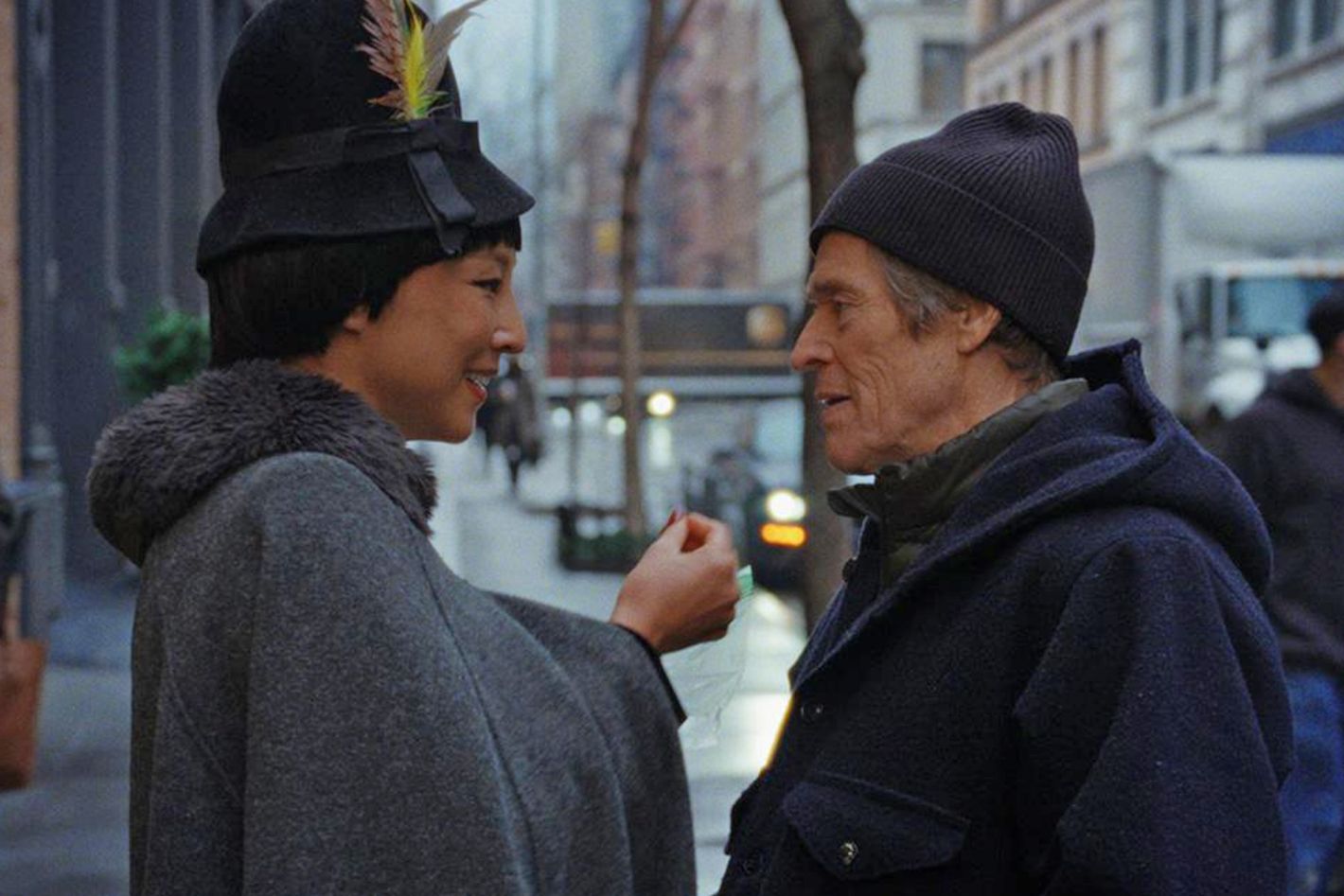
“You must have been beautiful when you were young,” Greta Lee says to Willem Dafoe at one point in Kent Jones’s Late Fame, and for those of us who well remember the actor’s younger years — back when his skin was porcelain, his cheekbones sea-cliff sharp, and his eyes so angelically haunted — it’s hard not to shout “Amen!” back at the screen. First, the line hits because it works within the context of the film: Ed Saxburger (Dafoe) is a postal worker who in his youth published a well-regarded but little-read book of poems, and he’s in the midst of fondly (and melancholically) recalling all the promise of those early years in New York, when poetry was in the air, “downtown was another world, and Soho was like being on the moon.” But it also helps the movie reach beyond the screen; some of us might begin to share Saxburger’s reveries along with our own.
The line also suggests that Lee’s Gloria Gardner, a downtown actress with an aura of mystery to her, appreciates Saxburger in this moment not for who he is, but for who he once was and the world he once belonged to. (Though, let’s face it: Dafoe still looks pretty great.) Loosely adapted from an Arthur Schnitzler novella, Late Fame, as the title implies, follows Saxburger’s rediscovery by an odd group of young writers and thinkers calling themselves “the Enthusiasm Society.” Led by the wealthy and snobbish Wilson Meyers (Edmund Donovan), who makes sure to tell Saxburger he bought his book at “Foyle’s on Charing Cross Road” with ever the slightest of fake English accents, these pampered dandies “stand against negativity” and the monetization of everything. They speak of the old virtues, they call each other by their last names, they discuss Big Important Literary Ideas over expensive wine dinners, and they rail against influencer culture and technology and cellphone addiction. But of course, they’re just as glued to their devices and obsessed with their brand. Meyers has Amazon Alexa tech in his Sullivan St. apartment (which is very nice, very expensive, and paid for by his parents), and a $1200 first edition of The Naked Lunch on display. We gather the other members of the Enthusiasm Society aren’t much different; Meyers says one guy’s family “owns every soybean in the state of Missouri.” (He also claims the Enthusiasm Society stands above politics, though in a film more firmly grounded in today’s world they’d probably be Dimes Square-adjacent, which is to say, not above politics at all.)
Schnitzler was a master of narrative high concept in his day. Whenever I see a plot description of one of his works, I find myself wanting to read the story immediately. And the premise of Late Fame is so captivating that one wants to forgive its shortcomings and focus on what it does so well, starting with a truly great and nuanced role for Dafoe, whose physical presence can evoke coarse sturdiness and emotional delicacy at the same time. Saxburger has a tough exterior; he’s reserved and unassuming in his demeanor; he avoids his sister’s calls about his dying brother, and he pushes back modestly against Meyers and his pals’ anointing him as America’s great undiscovered poet. But we also see that he once had art in him, and ambition, too. And we understand that such inner reserves of sensitivity aren’t always a good thing: After one triumphant reading, he hears someone yell out, “Way to go, grandpa!” and that one quip from that one random unseen person kicks eats away at him the rest of the evening.
Also doing excellent work here is Lee, who gives the vampish and self-consciously artificial Gloria a magnetic inner life. She’s not a writer, seems slightly older than these young wannabes, and we suspect she’s not nearly as rich; the more brazen and confident she is, the more we can tell there’s a lot more going on. This character probably twists through the most dramatic extremes over the course of the film (including a riveting cabaret performance of Kurt Weill and Bertolt Brecht’s “Surabaya Johnny”), and it’s to Lee, Jones, and screenwriter Samy Burch’s credit that the more we find out about her, the less we actually know about her.
So, that’s the good news. Unfortunately, Late Fame stumbles when it comes to its scenes with the Enthusiasm Society itself, which is unfortunate because that’s arguably the most interesting element in the picture, at least at first. But they’re ultimately too cartoonish for a film that otherwise feels so lived-in. It’s not that such tonal shifts can’t work, but here the comic-ridiculous treatment of these well-meaning poseurs seems driven by narrative convenience and the irresistibility of cheap laughs rather than anything resembling an inner life or observed reality. Come to think of it, Burch’s Oscar-nominated script for May December had a similarly slippery quality, but there it benefited from the deft hand of director Todd Haynes, whose work has always existed in a queasy tonal slipstream. Jones is a talented filmmaker — I was once on a Tribeca jury that gave his masterful previous feature Diane (2018) several well-deserved awards — and Late Fame has some true virtues. But as it proceeds, it feels less assured. Still, Dafoe and Lee are so good, and the idea behind the story so enchanting, that I keep wishing it were better. Maybe one day I’ll convince myself it is.
